- What is a root canal treatment and why would I need one?
This is a common procedure to treat inflammation or infection of a tooth’s pulp and root canal system.
Inflammation within a tooth’s pulp (it’s a central organ), is frequently caused by:
- deep decay in the tooth
- trauma or heavy knocks,
- repeated fillings on the same tooth
- cracks
- Why do I need x-rays when my teeth feel fine?
Our focus when examining your teeth is maintaining health and preventing disease.
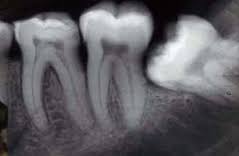 Radiographs or “x-rays” of your teeth and jaws, provide a lot of information about the state of your mouth such as:
Radiographs or “x-rays” of your teeth and jaws, provide a lot of information about the state of your mouth such as:- Small subsurface cavities
- Initial signs of bone loss around your teeth ( gum disease)
- Faults with existing dental work
The fees for x-rays are minor in comparison to the major dental work that may be needed if the dental disease has progressed too far.
- What is Whitening and is it safe for my teeth? How long does it last?
Whitening or bleaching of teeth is a process that has been used regularly by dentists for over 15 years.
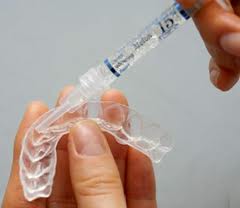 The method we provide is a custom-made kit that people use at home. This kit consists of using a bleaching gel, dispensed by syringes into a tray that fits precisely over your teeth. The trays are worn for 30-40 minutes per day for up to 2 weeks. People enjoy seeing their teeth whiten and can expect to become 2-3 shades lighter.
The method we provide is a custom-made kit that people use at home. This kit consists of using a bleaching gel, dispensed by syringes into a tray that fits precisely over your teeth. The trays are worn for 30-40 minutes per day for up to 2 weeks. People enjoy seeing their teeth whiten and can expect to become 2-3 shades lighter.If used correctly the lighter colour can be maintained by doing “top-up bleaching” every 2-3 months.
- What foods should my family eat or avoid to prevent dental problems?
Foods that are acidic, sticky and sweet can damage teeth. These include:
- Juice, flavoured milk, sports drinks, sweetened cereals, cordial.
- Dried fruit bars, muesli bars, sweet biscuits
- Soft drinks, vinegar, lollies, honey, tomato sauce, wine
Foods and snacks that are tooth-friendly:
- liDry biscuits, Pop corn
- Nuts
- Sliced ham, Salmon or Turkey
- Cheese
- Peanut Butter, Vegemite
- Sushi
- Cut-up vegetables
According to the Australia and New Zealand Society of Paediatric Dentistry (ANZSPD), for a healthy diet children need 3 pieces of fruit and 5 vegetables a day, a high intake of grain (wholegrain bread and cereal), protein (e.g. meat and fish) and three intakes of dairy products ( e.g. milk, cheese, natural yoghurt)
You should be aware that it is the frequency or number of times that teeth are exposed to sweet, acidic foods that is important, not the amount consumed.
- What are dental implants? Can they benefit me?
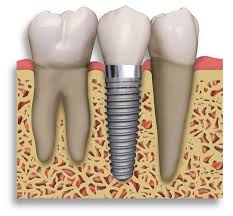 Dental implants have been used by dentists for over thirty years but have recently come into prominence and are even being advertised on the radio.
Dental implants have been used by dentists for over thirty years but have recently come into prominence and are even being advertised on the radio.They are inert titanium fixtures or screws that are inserted into a person’s upper or lower jaw in positions where they may be missing teeth.
Once placed there is healing time required (up to 3 months) to ensure the site has healed and the screw is strongly fixated in the bone (osseointegration). Crowns, bridges or dentures can be built on implants and they are a great way to permanently replace lost teeth.
Patients who have had implants are often very satisfied when they are completed and can chew and function well without difficulty.
- What is our practice privacy policy? Are all my details protected and safe?
Our practice complies with the following important legislation which protects you as an individual:
- Privacy Act 1988
- The Dental Board of Australia Code of Conduct
- The Dental Board of Australia Guidelines on Dental Records
- Victorian Health Records Act 2001
We take great care in securing and storing information and need to gain your consent for the collection of health information. You have the right to access your health records and transport them to another dental surgery if you wish.
- Should children and adults wear custom-fitted mouthgaurds from the dentist?
Most sporting clubs have a no-wear, no-play policy with mouthguards.
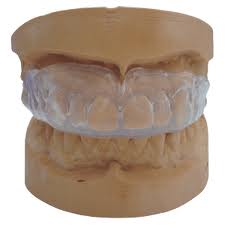 A properly made, vacuum-formed mouthguard:
A properly made, vacuum-formed mouthguard:- Protects the dental hard and soft tissues and reduces the impact of heavy knocks to the face and jaws
- Is comfortable to wear so children are more likely to be compliant with its use
- Allows the individual to concentrate on their activity and not be conscious of the guard dropping down when running, talking
- What if I am nervous of dental procedures?
It is very common for people to be nervous about having dental treatment, particularly if they have had a bad experience in the recent past or in childhood.
The use of modern technology and advanced dental techniques allows us to provide a surprisingly low pain experience at your appointments.
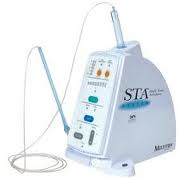 A great advance which is used daily at our surgery is the Single Tooth Anaesthesia system or “wand” anaesthesia. This unit delivers anaesthetic much slower than the traditional syringe and needle and patients often delight in reporting that it is virtually painless. This is particularly great for people who have had difficulty “going numb”.
A great advance which is used daily at our surgery is the Single Tooth Anaesthesia system or “wand” anaesthesia. This unit delivers anaesthetic much slower than the traditional syringe and needle and patients often delight in reporting that it is virtually painless. This is particularly great for people who have had difficulty “going numb”.- What of I haven't been in a long time?
Our team would stress to you that you should not be embarrassed about the initial state of your oral health. Our main message we can give is to not delay and give us a call.
People often feel much more in control of their dental affairs and empowered once they have had an examination and a carefully constructed plan made for their teeth and smile.
An examination takes roughly thirty minutes and includes formulating a treatment plan and scheduling appointments so that we make efficient use of your valuable time.

